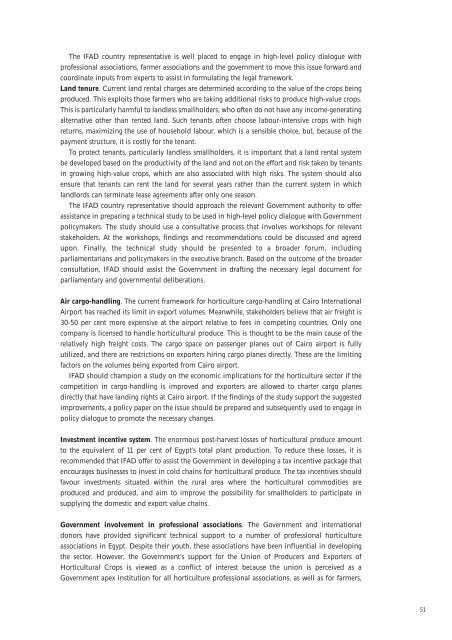Egypt: Smallholder contract farming for high-value and ... - IFAD
Egypt: Smallholder contract farming for high-value and ... - IFAD
Egypt: Smallholder contract farming for high-value and ... - IFAD
You also want an ePaper? Increase the reach of your titles
YUMPU automatically turns print PDFs into web optimized ePapers that Google loves.
The <strong>IFAD</strong> country representative is well placed to engage in <strong>high</strong>-level policy dialogue with<br />
professional associations, farmer associations <strong>and</strong> the government to move this issue <strong>for</strong>ward <strong>and</strong><br />
coordinate inputs from experts to assist in <strong>for</strong>mulating the legal framework.<br />
L<strong>and</strong> tenure. Current l<strong>and</strong> rental charges are determined according to the <strong>value</strong> of the crops being<br />
produced. This exploits those farmers who are taking additional risks to produce <strong>high</strong>-<strong>value</strong> crops.<br />
This is particularly harmful to l<strong>and</strong>less smallholders, who often do not have any income-generating<br />
alternative other than rented l<strong>and</strong>. Such tenants often choose labour-intensive crops with <strong>high</strong><br />
returns, maximizing the use of household labour, which is a sensible choice, but, because of the<br />
payment structure, it is costly <strong>for</strong> the tenant.<br />
To protect tenants, particularly l<strong>and</strong>less smallholders, it is important that a l<strong>and</strong> rental system<br />
be developed based on the productivity of the l<strong>and</strong> <strong>and</strong> not on the ef<strong>for</strong>t <strong>and</strong> risk taken by tenants<br />
in growing <strong>high</strong>-<strong>value</strong> crops, which are also associated with <strong>high</strong> risks. The system should also<br />
ensure that tenants can rent the l<strong>and</strong> <strong>for</strong> several years rather than the current system in which<br />
l<strong>and</strong>lords can terminate lease agreements after only one season.<br />
The <strong>IFAD</strong> country representative should approach the relevant Government authority to offer<br />
assistance in preparing a technical study to be used in <strong>high</strong>-level policy dialogue with Government<br />
policymakers. The study should use a consultative process that involves workshops <strong>for</strong> relevant<br />
stakeholders. At the workshops, findings <strong>and</strong> recommendations could be discussed <strong>and</strong> agreed<br />
upon. Finally, the technical study should be presented to a broader <strong>for</strong>um, including<br />
parliamentarians <strong>and</strong> policymakers in the executive branch. Based on the outcome of the broader<br />
consultation, <strong>IFAD</strong> should assist the Government in drafting the necessary legal document <strong>for</strong><br />
parliamentary <strong>and</strong> governmental deliberations.<br />
Air cargo-h<strong>and</strong>ling. The current framework <strong>for</strong> horticulture cargo-h<strong>and</strong>ling at Cairo International<br />
Airport has reached its limit in export volumes. Meanwhile, stakeholders believe that air freight is<br />
30-50 per cent more expensive at the airport relative to fees in competing countries. Only one<br />
company is licensed to h<strong>and</strong>le horticultural produce. This is thought to be the main cause of the<br />
relatively <strong>high</strong> freight costs. The cargo space on passenger planes out of Cairo airport is fully<br />
utilized, <strong>and</strong> there are restrictions on exporters hiring cargo planes directly. These are the limiting<br />
factors on the volumes being exported from Cairo airport.<br />
<strong>IFAD</strong> should champion a study on the economic implications <strong>for</strong> the horticulture sector if the<br />
competition in cargo-h<strong>and</strong>ling is improved <strong>and</strong> exporters are allowed to charter cargo planes<br />
directly that have l<strong>and</strong>ing rights at Cairo airport. If the findings of the study support the suggested<br />
improvements, a policy paper on the issue should be prepared <strong>and</strong> subsequently used to engage in<br />
policy dialogue to promote the necessary changes.<br />
Investment incentive system. The enormous post-harvest losses of horticultural produce amount<br />
to the equivalent of 11 per cent of <strong>Egypt</strong>’s total plant production. To reduce these losses, it is<br />
recommended that <strong>IFAD</strong> offer to assist the Government in developing a tax incentive package that<br />
encourages businesses to invest in cold chains <strong>for</strong> horticultural produce. The tax incentives should<br />
favour investments situated within the rural area where the horticultural commodities are<br />
produced <strong>and</strong> produced, <strong>and</strong> aim to improve the possibility <strong>for</strong> smallholders to participate in<br />
supplying the domestic <strong>and</strong> export <strong>value</strong> chains.<br />
Government involvement in professional associations. The Government <strong>and</strong> international<br />
donors have provided significant technical support to a number of professional horticulture<br />
associations in <strong>Egypt</strong>. Despite their youth, these associations have been influential in developing<br />
the sector. However, the Government’s support <strong>for</strong> the Union of Producers <strong>and</strong> Exporters of<br />
Horticultural Crops is viewed as a conflict of interest because the union is perceived as a<br />
Government apex institution <strong>for</strong> all horticulture professional associations, as well as <strong>for</strong> farmers,<br />
51

















